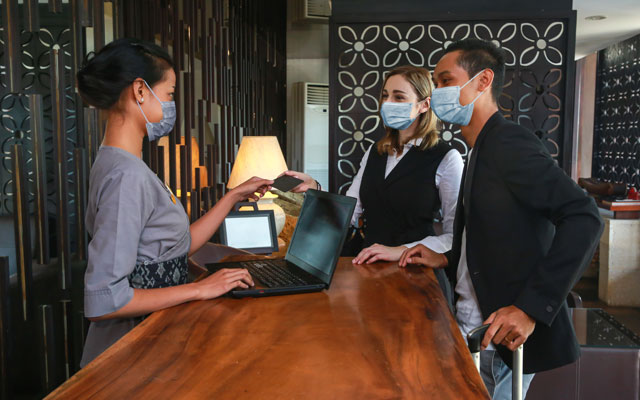While the adoption of contactless service has been typically slow in the hospitality industry, the pandemic and resulting consumer desire for services that are delivered in a safe and hygienic manner have resulted in swift changes.
- Health and safety concerns have expedited technology adoption by hotels
- Guests expect options for contactless service and experiences
- Contactless technology can work in favour of customer service culture, rather than against it
While the adoption of contactless service has been typically slow in the hospitality industry, the pandemic and resulting consumer desire for services that are delivered in a safe and hygienic manner have resulted in swift changes.
According to Eric Wong, vice president for hospitality, Asia Pacific with global software company Infor, this change is “shaping new realities for the hospitality industry”.

Solutions that enable seamless, contactless guest touchpoints that comply with safe distancing measures – from check-in to payment – are rising in popularity, as these can help hoteliers better address health and safety guidelines while ensuring that service standards are not compromised.
While these initiatives may still be strange for some hoteliers who are used to the people-driven service concept rooted in the hospitality industry, Wong said that it was time to embrace change so as to move forward.
“The pandemic has really pushed the industry to start thinking about whether there are new ways to do things, perhaps more efficiently, more securely and in ways that prioritise the experiences of guests,” Wong remarked.
Concurring with Wong, Michael Hanratty, general manager of both G Hotel Gurney and G Hotel Kelawai in Penang, said: “The contactless experience will definitely be the new normal and a travel trend once domestic and international travel resumes.”
Hanratty noted that the reliance on technology was stronger now than pre-Covid-19, as consumers’ behaviours have changed dramatically.
“They are more conscious about maintaining social distancing and avoiding crowds. Thus, one of the initiatives taken by our two properties is to introduce seamless online check-in prior to guests’ arrival at the hotel. Instead of manually filling in details at the reception counter, guests can now check-in online and collect their keys upon arrival.
“This not only makes the check-in process so much faster and more comfortable for guests, it also helps with crowd control at the check-in counters,” he said.

G Hotel Gurney and G Hotel Kelawai were among the first hotels in Malaysia to invest in equipment to measure temperature via facial recognition and facilitate contactless QR code check-ins. The hotels also implemented automated hand sanitiser machines at entry points.
For Alex Castaldi, senior general manager of Sunway City Kuala Lumpur Hotels, digital transformation is no longer an option.
Its flagship property, Sunway Resort, is currently undergoing a major transformation to bring in cutting-edge technology that will improve the guest experience. When the resort reopens in phases from 3Q2021, contactless protocols will be enforced in accordance to the Sunway Safe Stay commitment. Guests can expect keyless room access as well as a flexible event space suitable for hybrid and virtual events.
Noting how the pandemic has altered booking considerations, Mandar Vaidya, CEO of OYO Japan, South-east Asia and Middle East, said: “Before the pandemic, people looked for properties near airports, business districts, and in some instances, beaches. Now they are looking for clean and hygienic properties that offer a contactless experience.”
To win over guests of today and the future, OYO’s health and safety standard operating procedures include minimal-touch check-in and check-out systems, robust hygiene and safety training for staff, and strict enforcement of social distancing norms.
OYO properties that are certified with a ‘Sanitized Stay’ label get twice the number of guests than those without, revealed Vaidya.
A balancing act
Hoteliers looking to step up technology usage have to ensure that service standards and personalised human connections are not compromised.
Castaldi told TTG Asia that Sunway Resort’s technology transformation was ultimately driven by the desire to cater to the millennials who have a strong preference for a more personalised interaction.
Despite heavy investments poured into the transformation, the human touch through efficient service, authenticity and personalised attention will not be compromised, he asserted.
In fact, contactless solutions can work alongside hotels’ service-oriented culture and not against it.
Wong explained: “By providing guests with a safer user experience, contactless solutions can reduce friction that may arise from face-to face interactions or manual processes.”
Such an approach will ensure the peace of mind that guests seek.

Hanratty identified another benefit of technology adoption – with technology taking over repetitive and manual tasks, hotel staff have more time to focus on delivering attentive service.
“They have now more time to move around the properties to service guests directly, resulting in more face time and enhancing the overall guest experience,” he said.
To ensure that the human connection is never neglected with the adoption of contactless experiences, Vincent Ong, senior vice president (commercial), Club Med Southeast Asia Marketing, Asia Pacific, said staff continue to embody the Club Med spirit and exude their personalities through the veil of a compulsory face mask and while respecting safe distancing measures.
However, Ong acknowledged that there are limits to the pursuit of contactless experiences for health and safety reasons. Club Med’s iconic activities, such as flying on the trapeze and sports games, cannot be replaced by contactless alternatives.




















